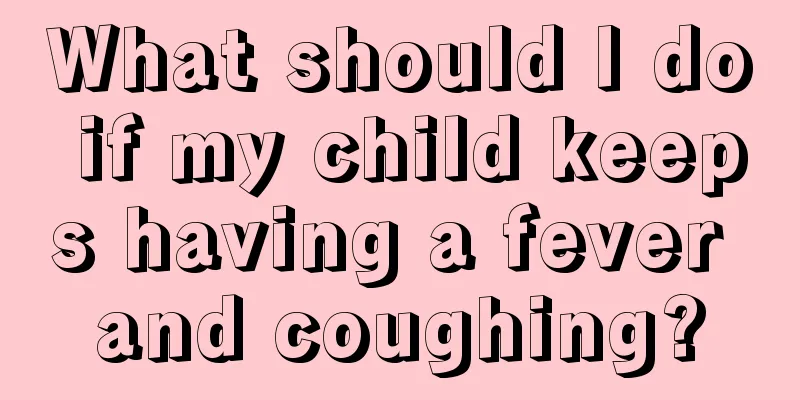Why does the baby's soles sweat?

|
Although the baby's body temperature is generally high, sweating symptoms will occur in the summer due to the high temperature. However, if the baby's soles sweat in the cold winter weather, this is caused by problems with the baby's internal organs. Sweating of the baby's hands and feet is what we often call pediatric night sweats in daily life. Many babies will experience night sweats due to physical weakness. Let us understand why the baby's soles sweat. Since children with spleen deficiency often show a group of comprehensive symptoms, comprehensive prevention and treatment measures should be taken for treatment. The most important thing is that parents should learn some scientific parenting knowledge and pay attention to the following issues: 1. Strengthen nutrition, eat a reasonable diet, combine meat and vegetables, and eat both coarse and fine foods. Correct the child's picky eating and anorexia habits to enhance physical fitness. 2. Pay attention to physical exercise. Sports such as swimming, skating, ball games, running, etc. can be arranged as appropriate. 3. Avoid contact with infection. 4. You can use dietary therapy to enhance the function of the spleen and stomach. For example: Yam and carrot porridge: peel and slice the yam, add carrots, cook with white rice, and eat in the morning and evening; you can also add lotus seeds, jujubes, coix seeds, astragalus, etc. according to the situation. 5. Massage and ear acupuncture therapy: (1) Massage the abdomen, rub the Zhongwan point, replenish the spleen and earth (the spiral surface of the last knuckle of the thumb), and press and rub the Zusanli point. (2) Select the lung, spleen and subcortical auricular points for massage. Stop when you feel a sense of heat and swelling. Massage each point 60 times. One course of treatment is 10 days. Or choose the above-mentioned acupoints to stick ear beans and keep them for 15 to 20 days. When children have night sweats, the first thing to do is to find out the cause in time and give appropriate treatment. Drug treatment is generally not recommended for physiological night sweats. Instead, appropriate measures should be taken to eliminate factors in life that cause high fever. For example, if a child exercises too much before going to bed, or eats a high-calorie meal that causes night sweating, the child's activity level and food intake before going to bed should be controlled. This will also help the child sleep and control obesity, and is beneficial to the child's physical and mental health. Some children sweat profusely at night because the room temperature is too high or the quilt is too thick. The bedroom temperature in winter should be between 24℃ and 28℃; the thickness of the quilt should be increased or decreased with the change of temperature. Generally speaking, if parents pay attention to the above-mentioned factors that may easily cause increased heat production and overcome them, the chances of night sweats will naturally decrease. Even if children occasionally have one or two severe thieves sweats, there is no need to worry too much. The main loss of body fluids and salts due to night sweats can be fully replenished through a reasonable daily diet. Calcium and vitamin D must be supplemented at the same time. Vitamin D is the carrier for calcium ions to be absorbed by the human body. Without vitamin D, no matter how much calcium is taken, it will not be absorbed. Calcium tablets contain vitamin D, which can double the body's absorption of calcium ions. For children with pathological night sweats, treatment should be directed at the cause. Night sweats caused by calcium deficiency should be supplemented with calcium, phosphorus, vitamin D, etc. And the following points should be achieved: (1) Get more exposure to sunlight, including outdoor light and reflected light. You can do activities outdoors, but don't expose yourself to the sun through glass. (2) Vigorously promote breastfeeding. (3) Premature infants, twins, children with frequent diarrhea or other digestive tract diseases should pay attention to adding vitamin D. (4) People in rural areas or cold regions in the north should take measures to prevent rickets, such as "sunbathing in the summer and taking D-drugs in the winter". For night sweats caused by tuberculosis, regular anti-tuberculosis treatment should be carried out under the guidance of a doctor. The above is the explanation for the sweating on the soles of the baby's feet. Malnutrition of the baby will cause symptoms of sweating. Diet therapy is one of the most effective methods. Massage, acupuncture and other methods are one of the Chinese medicine conditioning methods and will not cause serious damage to the baby's body. It will not bring any side effects, so if the above symptoms occur, mothers can try Chinese medicine conditioning methods. |
<<: What are the treatments for vitiligo in children?
>>: What to do if your baby has a fever and itchy palms
Recommend
First aid treatment for convulsions in children
Parents usually feel very worried after their chi...
How to cure baby hiccups?
Baby hiccups are a phenomenon that many parents w...
Small testicles in infants
When a baby is just born, the testicles are relat...
How to cultivate children's eating habits
I believe everyone knows the importance of diet t...
The efficacy of blood sugar syrup for children
Children's resistance is often not as strong ...
What are the causes of drool rash in children?
Nowadays, most families have a baby. The whole fa...
How to improve baby's digestive system?
Generally speaking, the digestive system function...
Symptoms of cerebral palsy in newborns
After the baby is born, many parents are so excit...
Causes of small holes in the heart of newborns
After every newborn is born, regular physical exa...
Can babies eat papaya? Please learn how to eat correctly
Parents must be careful when feeding papaya to th...
Causes and treatment of small red pimples on a 3-year-old baby's face
The baby's skin is very good! If you are not ...
Causes of inverted nipples in girls
Nipples are an important symbol of women, and fir...
What to do if a child has warts on his face
If you accidentally find that your child has wart...
Education of a 3-year-old
The education of 3-year-old children is a topic t...
How to care for children with hip dislocation
The health of every child is the most worrying is...









